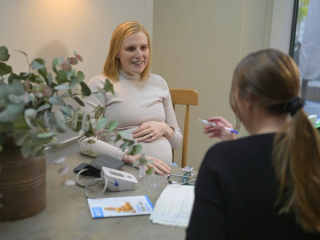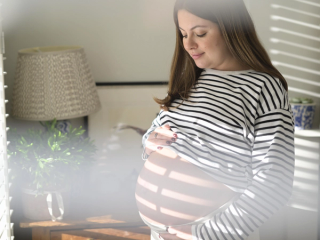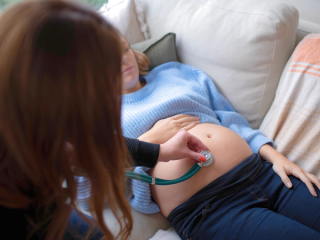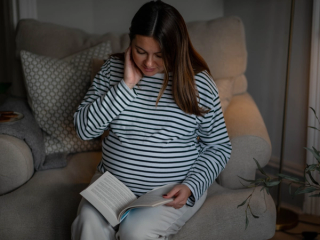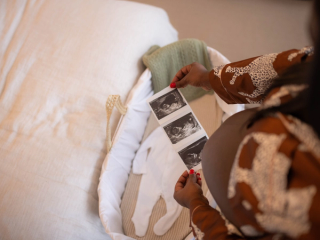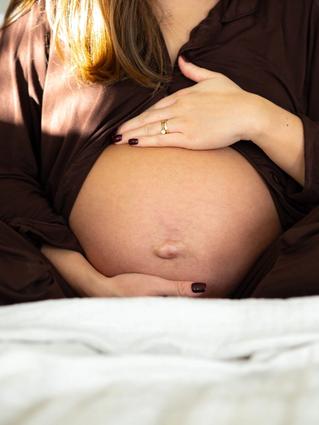
- Home
- Advice Hub
- Pregnancy
- Pregnancy Tips & Support
- First Trimester Of Pregnancy: Everything You Need To Know
What to expect during the first trimester of pregnancy
Key stages of the first trimester
Pregnancy is considered full term at 37 weeks, but can last up to 42 weeks. It is split into three parts called trimesters. The first trimester is weeks 1 to 12, i.e. roughly the first three months of your pregnancy.
Given that you may not find out you’re pregnant until 2 – 3 weeks into the first trimester, this first part can seem as though it whizzes by. However, if you’re suffering with morning sickness or other symptoms of early pregnancy, it might feel much longer than 3 months.
Within this first trimester there are three key milestones:
- First, finding out you’re pregnant.
- Second, a booking-in appointment with your midwife (more on that in a bit).
- Finally, capping off the third trimester is the 12-week ultrasound scan, where you get to see the tiny baby that’s growing inside you.
What to expect during the first trimester of pregnancy
Every pregnancy is different – even for the same person – and so it’s difficult to know exactly how your body and mind will react to being pregnant. However, there are some common symptoms and changes to your body.
Morning sickness and fatigue
Many women experience fatigue in this trimester. This can vary from feeling noticeably less energetic, or tired at particular times in the day, to ‘ugh, I never want to leave my bed’.
If you’re also suffering from morning sickness, the combination can be debilitating, and you might struggle to carry on as normal.
Remember, there’s no rule that says you can’t tell anyone you’re pregnant in this first trimester. That’s an entirely personal decision, and if it makes sense to you to share with family, friends and/or colleagues that you’re feeling unwell because you’re pregnant, then do so. They may be able to support you, or at least cut you some slack while you get through this stage.
It’s important to rest and give yourself a break – and if resting isn’t helping, talk to your health professional. Some people suffer with very serious sickness called hyperemesis gravidarum, which may require medical support.
Hormone rollercoaster
Pregnancy comes with a lot of hormones, which can have wide-ranging effects. For example, diarrhoea in the first trimester of pregnancy could be a side effect of the rush of hormones your body is producing, which impact your gastrointestinal tract. Or, if you’ve changed your diet to include more fibre, you might find that is having an effect on your bowels!
Hormones could also be to blame for any mood changes you experience in these first few months – though, equally, feeling tired and sick would make anyone moody. On the plus side, you might experience some benefits from the hormones too, like that pregnancy glow.
Bleeding in the first trimester
If you experience some bleeding during the first trimester, don’t panic. Light bleeding or spotting is quite common in early pregnancy as the embryo implants itself in the lining of your uterus. This may also be accompanied by some cramping. Heavier bleeding and more severe pain can be a sign of miscarriage, which occurs in about 1 in 5 pregnancies, typically in the first 14 weeks of pregnancy.
If you are worried, contact your GP or midwife. Likewise, if you have any symptoms of an ectopic pregnancy – severe pain, bleeding, discomfort when going to the toilet, or pain in the tip of your shoulder – call 111.
Calculating your due date
As soon as you find out you are expecting, you will probably start trying to figure out when your baby is due. Your due date is counted not from the date of conception, but from the first day of your last period – so you might find out you’re further along in your pregnancy than you thought!
Our due date calculator will help you calculate approximately when your baby is due, but remember: pregnancy is normally between 37 – 42 weeks, so there are no guarantees of when your baby will arrive.
Do’s and don’ts in the first trimester
Sometimes it feels like pregnancy is full of rules – things you should and shouldn’t eat, or things you can and can’t do. But while it’s true that some foods and drinks, such as alcohol and caffeine, should be limited or avoided, you’ll find the list isn’t as extensive as you might fear.
The general advice is to follow a healthy, balanced diet and make sure you stay hydrated. There are also recommended supplements for the first trimester and throughout pregnancy to help ensure you’re getting all the vitamins and nutrients you and your baby need.
Stay active
In terms of activities, if you feel energized enough to exercise – go ahead. Our experts have shared their tips for staying active during pregnancy, so check those out for ideas on what you can do to build your strength for pregnancy and labour.
Take care of yourself
Sleep and rest are so important during this first trimester, so make sure you put your feet up when you can and give yourself some time to recuperate – particularly if you’re struggling with pregnancy symptoms.
You might also find that anxiety around your pregnancy and impending parenthood are making it hard to sleep. Share your worries with your partner or trusted friends and family, and if you’re really struggling, talk to your midwife or health professional. Keeping all lines of communication open will help your loved ones support you through this emotional time.
Meeting your midwife
Your first meeting with your midwife will likely take place at around 6 – 10 weeks when you have what is known as a booking-in appointment. This appointment gives you a chance to get to know your midwife, and allows them to take your medical history and give you some information about what to expect in terms of medical appointments during your pregnancy, foetal development, birthing options, etc.
Antenatal screening tests
Prenatal blood tests are usually carried out before 10 weeks. These antenatal screening tests are used to identify conditions that affect either you or the baby, enabling you to be cared for appropriately during your pregnancy.
After that, your next appointment will be that special milestone – the dating scan, which usually happens between 10 and 14 weeks. At this antenatal ultrasound scan you’ll be able to see the baby and hear its heartbeat, a very special moment indeed.
Common questions in the first trimester
How do I know my pregnancy is going well?
The truth is, in this first trimester when you’re unlikely to notice a growing bump, it’s hard to know what’s going on in there. That’s why the ultrasound scan feels like such a milestone. Whether you are feeling relatively well or experiencing terrible morning sickness bears little relation to how well the foetus is developing.
Pregnancy really is different for everyone, every time.
The best thing you can do is look after yourself as well as you can, keep your antenatal appointments, and try not to worry – even though worrying is all part of the work of parenting! If you are concerned at any time, or if something doesn’t feel right, you should always talk to your health professional. You know your body best.
What is a foetus?
The foetus is the name given to your unborn baby once it has passed the embryo stage.
How long after conception does the embryo become a foetus?
This officially happens in the ninth week after conception. First, it’s a zygote (a single cell embryo), then an embryo, then a foetus, and at birth it is officially a baby.
At how many weeks pregnant will I start showing?
If this is your first pregnancy, you’re unlikely to start showing until the second trimester. Your uterus will become more rounded to accommodate your growing baby, and at that point – maybe around 13 weeks – you might notice a slight bump. But everybody is different, and some people may not see any changes to their appearance until several weeks later.
If this is not your first pregnancy, you will probably start showing earlier, as your muscles and organs have already experienced this shift before.
Is it normal for pregnancy symptoms to come and go?
In short, yes. Pregnancy symptoms like morning sickness, sore breasts, fatigue, etc. will not necessarily be consistent throughout your first trimester. Sometimes you might notice symptoms worsen, for example, if you haven’t had enough rest, or you’re dehydrated.
Remember, some people will experience no symptoms at all, and that doesn’t mean there’s a problem. However, if you are concerned that you no longer ‘feel’ pregnant, or if you suddenly feel worse to the point you can’t carry out your normal activities, then talk to your midwife or GP.
Got questions? At the HiPPBabyClub, we bring you real-world advice and support from HiPP parents, midwives, nutritionists and more. Join our baby club today.
